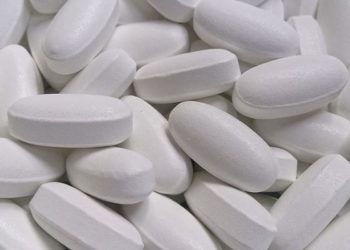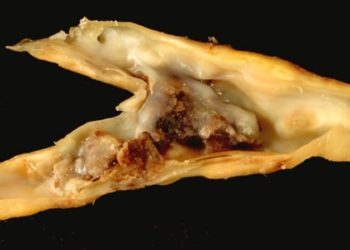The JUPITER: Rosuvastatin in healthy patients with elevated CRP levels [Classics Series]
1. In patients with average LDL cholesterol levels and elevated CRP, rosuvastatin significantly reduced the risk of a first major cardiovascular event compared to placebo
2. Rosuvastatin therapy also significantly reduced the risk of all-cause mortality compared to placebo
3. The study was terminated early and did not meet the prespecified number of primary endpoints needed to be sufficiently powered
Original Date of Publication: November 2008
Study Rundown: Statins are commonly used medications in the treating patients with vascular disease and known hyperlipidemia. It had been noted previously that many myocardial infarctions and strokes occur in patients with normal levels of low-density lipoprotein, and in whom, statin therapy would not be warranted based on guidelines at the time. Similarly, C-reactive protein (CRP), a marker of inflammation, has been shown to be a predictor of vascular events. The Justification for the Use of Statins in Prevention: an Intervention Trial Evaluating Rosuvastatin (JUPITER) sought to determine whether statin therapy could prevent major cardiovascular events in patients with LDL cholesterol levels below treatment thresholds and elevated CRP levels.
In summary, the JUPITER demonstrated that treating patients with LDL cholesterol below treatment thresholds but elevated CRP levels with rosuvastatin significantly reduces the rate of first major cardiovascular events as compared to placebo (HR 0.56; 95%CI 0.46-0.69). Of note, the rates of adverse events were similar in the two groups. Interestingly, this trial was terminated early with a median follow-up less than 2 years. As a result, the trial did not have the prespecified 520 confirmed primary endpoints needed to be sufficiently powered.
Click to read the study in NEJM
In-Depth [randomized, controlled trial]: A total of 17,802 patients were enrolled and randomized as part of the JUPITER. In order to be eligible, patients needed to meet age requirements (≥50 years of age for men, ≥60 years of age for women), have no history of cardiovascular disease, have an LDL cholesterol <130 mg/dL, and have a high-sensitivity CRP level ≥2.0 mg/L. Exclusion criteria included previous or current use lipid-lowering therapy, current use of post-menopausal hormone-replacement therapy, evidence of hepatic dysfunction, elevated creatine kinase level, creatinine >2.0 mg/dL (176.8 μmol/L), diabetes, and uncontrolled hypertension. Moreover, patients with inflammatory conditions (e.g., severe arthritis, lupus, inflammatory bowel disease) were also excluded. Eligible patients were randomized to treatment with either rosuvastatin 20 mg daily or placebo. Follow-up occurred up to 60 months after randomization. The primary outcome was the occurrence of a first major cardiovascular event (i.e., nonfatal myocardial infarction, nonfatal stroke, hospitalization for unstable angina, arterial revascularization procedure, or death from cardiovascular cause).
Patients were followed for a median of 1.9 years. The rate of the primary endpoint was significantly lower in the rosuvastatin group as compared with the placebo group (HR 0.56; 95%CI 0.46-0.69). This was driven by significant reductions in all components of the primary endpoint, except for hospitalization for unstable angina (HR 0.59; 95%CI 0.32-1.10). Notably, patients treated with rosuvastatin experienced a significant reduction in all-cause mortality when compared to those treated with placebo (HR 0.80; 95%CI 0.67-0.97). The rates of adverse events reported were similar for the two groups (p=0.60). The rates of myopathy (p=0.82), newly diagnosed cancer (p=0.51), gastrointestinal disorder (p=0.43), and elevations in hepatic transaminases (p=0.34) were similar in the two groups.
Image: PD
©2012-2014 2minutemedicine.com. All rights reserved. No works may be reproduced without expressed written consent from 2minutemedicine.com. Disclaimer: We present factual information directly from peer reviewed medical journals. No post should be construed as medical advice and is not intended as such by the authors, editors, staff or by 2minutemedicine.com. PLEASE SEE A HEALTHCARE PROVIDER IN YOUR AREA IF YOU SEEK MEDICAL ADVICE OF ANY SORT.




